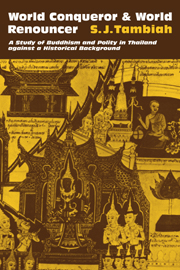 World Conqueror and World Renouncer
World Conqueror and World Renouncer Book contents
- Frontmatter
- Contents
- Acknowledgments
- PART ONE
- 1 Introduction: Reconstructing a Journey
- 2 From Rajadharma (the King's “Whole Duty”) to Dharmaraja (the “Righteous Ruler”)
- 3 The Brahmanical Theory of Society and Kingship
- 4 The Early Buddhist Conception of World Process, Dharma, and Kingship
- 5 Asoka Maurya: The Paradigm
- 6 Thai Kingship and Polity in Historical Perspective
- 7 The Galactic Polity
- 8 The Kingdom of Ayutthaya: Design and Process
- 9 Asokan and Sinhalese Traditions Concerning the Purification of the Sangha
- 10 The Sangha and the Polity: From Ayutthaya to Bangkok
- 11 The Nineteenth-Century Achievements of Religion and Sangha
- 12 The Sangha Acts of 1902, 1941, and 1963
- PART TWO
- Bibliography
- Index
10 - The Sangha and the Polity: From Ayutthaya to Bangkok
Published online by Cambridge University Press: 10 November 2010
- Frontmatter
- Contents
- Acknowledgments
- PART ONE
- 1 Introduction: Reconstructing a Journey
- 2 From Rajadharma (the King's “Whole Duty”) to Dharmaraja (the “Righteous Ruler”)
- 3 The Brahmanical Theory of Society and Kingship
- 4 The Early Buddhist Conception of World Process, Dharma, and Kingship
- 5 Asoka Maurya: The Paradigm
- 6 Thai Kingship and Polity in Historical Perspective
- 7 The Galactic Polity
- 8 The Kingdom of Ayutthaya: Design and Process
- 9 Asokan and Sinhalese Traditions Concerning the Purification of the Sangha
- 10 The Sangha and the Polity: From Ayutthaya to Bangkok
- 11 The Nineteenth-Century Achievements of Religion and Sangha
- 12 The Sangha Acts of 1902, 1941, and 1963
- PART TWO
- Bibliography
- Index
Summary
We have paid some attention to Asokan and Sinhalese traditions in the previous chapter in order that we may better understand the dialectics of the relationship between the sangha and the political authority in Thailand. There is in fact an established historical tradition for an ecclesiastical organization and hierarchy, paralleling the secular, periodically regulated by king and polity – a tradition that confirms the Sinhalese precedents.
It is proposed to study in some detail the idiom and rhetoric of sangha purification, the circumstances encouraging such intervention by the political authority, and the details of the administrative hierarchy set up as a consequence, during the Bangkok period. We shall particularly concentrate on Rama I, Rama IV (Mongkut), and on the Sangha Act of 1902 (enacted by Rama V [Chulalongkom]), and the acts of 1941 and 1963 promulgated in the postrevolutionary period ushered in in 1932. But before we undertake that examination, we must marshal whatever evidence we can concerning the nature of sangha organization in the Ayutthayan era and how it may have been linked with the secular administrative machinery.
The Sangha Organization in the Ayutthaya Era
The assumption that in Thailand a national organization of the sangha directly related to the political authority of the king and his administration only became established in the first reign of the present Chakkri dynasty (which started in 1782) is not strictly accurate and may well surprise us in the light of the Sinhalese historical precedents for such an organization that we have already cited.
- Type
- Chapter
- Information
- World Conqueror and World RenouncerA Study of Buddhism and Polity in Thailand against a Historical Background, pp. 179 - 199Publisher: Cambridge University PressPrint publication year: 1976
